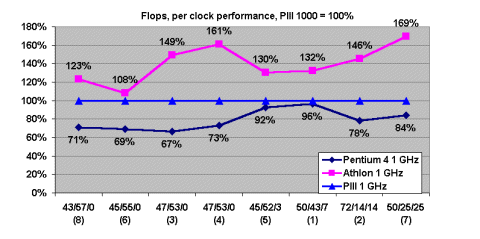Mensen die over de Pentium 4 vs. Athlon discussie nadenken op een meer beschaafde manier dan SoR zullen dit artikel van Ace's Hardware over de Pentium 4 zeker interessant vinden. Er worden hier namelijk geen Quake3 rondjes gedraaid, maar de drie belangrijkste onderdelen van de core (ALU, FPU en branch predictor) worden individueel en uitgebreid bekeken. Daardoor komen een aantal interessante punten aan het licht die de relatief lage performance van de chip in sommige situaties kunnen verklaren en ook waarom hij op andere punten uitblinkt.
Uiteindelijk moet men tot de conclusie komen dat de huidige standaardbenchmarks niet geschikt zijn om een goed beeld van de processor te vormen. Moderne compilers kunnen er wel eens voor gaan zorgen dat de P7 architectuur in de toekomst een stuk sterker blijkt te zijn dan met tot nu toe in reviews moest concluderen. Doormiddel van een simpele recompile (dus geen SSE2 implementatie in assembler, hoewel dat natuurlijk ook geen kwaad kan ![]() ) zou uit de Pentium 4 namelijk wel eens een flinke hoeveelheid extra snelheid gesleept kunnen worden. Hoeveel dat precies scheelt is men op dit moment aan het uitzoeken en zodra er een conclusie getrokken kan worden zal er een volgend deel verschijnen:
) zou uit de Pentium 4 namelijk wel eens een flinke hoeveelheid extra snelheid gesleept kunnen worden. Hoeveel dat precies scheelt is men op dit moment aan het uitzoeken en zodra er een conclusie getrokken kan worden zal er een volgend deel verschijnen:
I'm glad you were able to work through all the tech talk, as this is the most important part of the whole article. What contribution to our understanding of the Pentium 4 vs Athlon debate can these results possibly make? As you know, most FPU intensive benchmarks and Integer intensive benchmarks run faster on the Athlon 1200 (with DDR SDRAM). Our "code-sample" benchmarks proved this once again. Still, Intel is able to slap AMD's flagship silly in SpecInt and SpecFP.
[...] Yes, the SpecFP benchmark is more constrained by memory bandwidth than typical PC applications, and behaves more like its brother Spec ViewPerf, but does that mean that the Pentium 4 can only shine in bandwidth intensive applications? What about the fourth reason we listed above? Is it possible that the way that today's applications are compiled violate many important rules (see the optimization guide) of modern superscalar out of order CPUs and that those violations hurt the Pentium 4 more than the Athlon? We'll save that part of the discussion for next time.
 |
Lees het hele artikel met alle benchmarks en uitleg hier.
